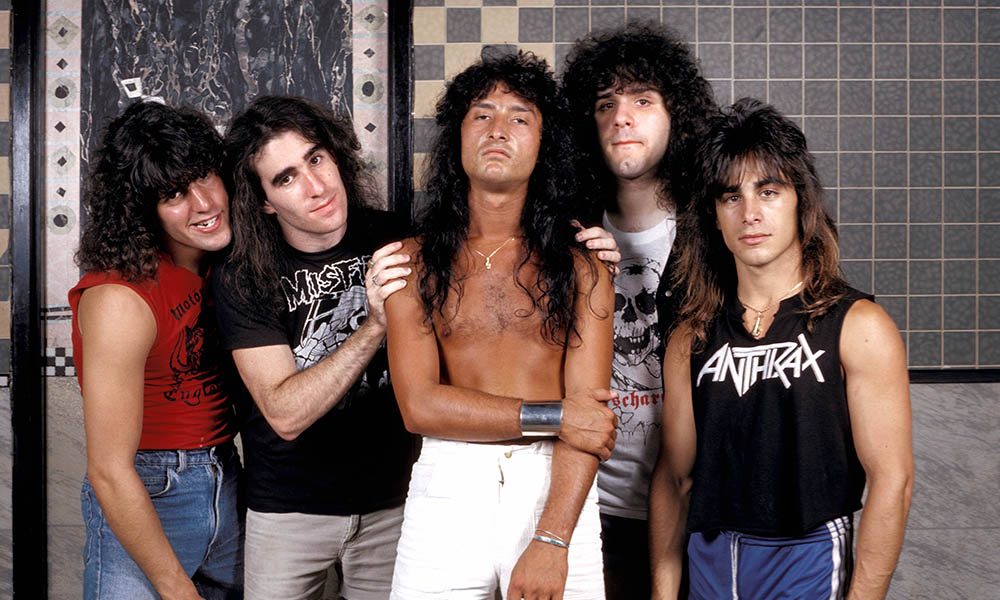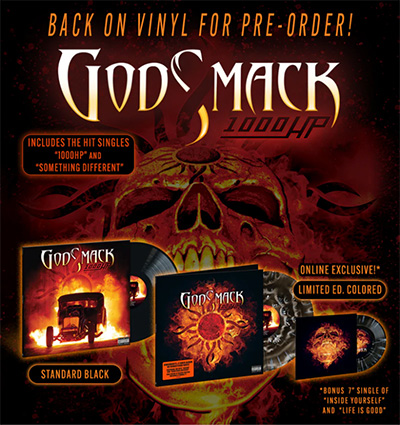Anthrax: One On One With Scott Ian

Iconic, fearless and stronger than ever, New York thrash veterans Anthrax have been punishing the mainstream for over 30 years with their innovative metal anthems. The band’s 11th studio album, For All Kings, emerged earlier this year to rave reviews, and sees the band join peers Slayer and Megadeth in enjoying some of the highest-ranking heavy metal album sales of 2015 and early 2016.
Founding member Scott Ian tells uDiscover exactly why, 30 years after the release of their groundbreaking Spreading The Disease album, he’s lost none of his enthusiasm for playing with his legendary band, and recalls what life was really like when they broke through into the mainstream.
“I get really excited about releasing new music, and I don’t think that has ever changed over all this time,” Ian says, stroking his infamous goatee. “Every time I walk into the studio to begin recording, I get the same amount of excitement that I did when I was laying down Fistful Of Metal, back in 1984.”
For a road-hardened band such as Anthrax, live performance, too, continues to provide a buzz. “On our European tour with Slayer, back in November 2015, we hadn’t done a seven-week run like that in something like 20 years – and all of a sudden it’s like, OK we’re off!… Playing shows is far greater than the hardship of travelling. I just love getting on stage and playing gigs. It never, ever gets old.”
Smiling, he continues, “I think it was KISS’ Gene Simmons who once said that there’s no other job you can do that gives you this reaction from a crowd. I mean, you could get [a reaction] from live theatre – Broadway, The West End, or something like that – but they’re not doing The Book Of Mormon in front of 80,000 people.” Ian laughs, adding, “They probably should, because that would be awesome.
“When people ask things like, ‘When are The Rolling Stones gonna quit?’ You know what? They’re never going to call it quits – why would they? It’s the adrenaline, man! You don’t get that anywhere else – this addiction, this drug. I don’t care if you’re a struggling dude playing with four of your friends in a bar, it still feels like that… Sometimes I go out and play with my wife’s band, Motor Sister, which is nowhere near the same level as what Anthrax does, but we could be playing to 30 people in a bar in LA and I am still just as excited.”
With the summer festival season fast approaching, and For All Kings enduring alongside Anthrax’s best work, Ian relishes the chance to reach a new audience at this stage in the band’s career. “We love playing metal festivals,” he says, “but as a band and from a business perspective, if we get to be on these more mainstream, eclectic bills, then we’re playing in front of lots and lots of people that may have heard the name of the band, but definitely do not own any of our records.
“So we get up there and do our thing and I guarantee that a small percentage of that audience will go home, check out something online and” – he add with a humourous tone – “then maybe steal some music.” Ian continues: “Those people might eventually buy the music – and maybe next time we’re playing in their town or local area, they might buy a ticket, because they really enjoyed themselves [before] and now they want to come back and see us do a headline show.”
Though Anthrax has a huge global fanbase, Ian feels there is always room for more. “There’s nothing wrong with preaching to the converted, because when you’re playing a show like Bloodstock in the UK, Wacken in Germany or Loud Park in Tokyo – with those shows we’re with our people, and those gigs are way more exciting to play. It almost doesn’t feel like work, it’s more like Christmas morning!” Conversely, more mainstream festivals can find the band on “really weird bills”. “We found ourselves at a festival in Sweden with Lana Del Rey, and we were just looking at each other thinking, What the f__k are we even doing here?”
Back in the early 80s, the thrash explosion was very much an underground affair, yet Anthrax emerged to become one of the genre’s mightiest bands. Alongside Metallica, Slayer, Exodus and Testament, Ian and co moulded heavy metal into a globally adored music that’s now accepted by the mainstream.
“You know, when you’re actually part of all of this history, it’s kind of hard to see things that way,” he says. “Since Day One, which was 18 July 1981, when bassist Danny Lilker [ex-Anthrax, Nuclear Assault, Brutal Truth] and I started the band, we felt like we really had something to say!”
Ian continues, “There’s a reason why Anthrax still exists as a band, and a reason why metal-heads all over the world like us, and that’s because we had something different to give which hadn’t really been done before. When things started to blow up around us, around 1987 with Among The Living, we could see that our formula was working.”
Finding themselves going from playing in front of “500 people at a club show to 5,000 people in a large theatre” in the space of eight months, between May and December ’87, Scott recalls thinking, “Where the f__k did all these people come from? Where were they a year and a half ago?”
As he leans in and recalls those early days, a grin spreads across his face. “It was really trippy. We were working so hard and so constantly in the thick of it that we hardly came up for air. But there are a few moments that stand out.”
Ian recalls standing at the side of the stage with Anthrax drummer Charlie Benante and watching Celtic Frost open for them in late ’87. 5,500 people had gathered to see Anthrax headline Chicago’s Aragon Ballroom; the last time they’d played the city was to “more like 1,000” at the Metro. “So we’re standing there and I say, ‘When did all of this happen?’ Charlie looks at me, shrugging his shoulders like, ‘I don’t know, man.’” Raising his tattooed arms to his head, Ian is clearly still flattered by the fan adoration. “I was just thinking, Holy s__t, this is f__king insane!”
Four years later, in 1991, the group had embarked on their biggest live engagement yet, the Clash Of The Titans tour, which saw them cross the States with Megadeth, Slayer and Alice In Chains. “We ended up headlining Madison Square Garden, for Christ’s sake!” Ian says. “Bear in mind, when this happened I was still living in this tiny, s__tty apartment, and was basically near broke! I hadn’t made any money from being a musician – well, nothing worth talking about, that’s for sure. I had enough to not have a day job, but that’s about it.”
Ian characterises this as a time when he was “just ‘surviving’ – for want of a better word”, but his eyes widen when he recalls the band’s business manager phoning to ask where to send his check. “I’m scratching my head, saying, ‘Check? A check for what?’ Because at this point in my career the only money that we ever received was when you signed a new deal and you got a small little advance. If you were really lucky, you’d get $5,000 or something like that, and I would normally be like ‘Woo-hoo!’ I can go buy a new TV.” He grins before continuing:
“So this guy is on the phone asking where to send the check, and I’m asking him, ‘What did we do? Did we sign a new merchandise deal or something?’ He answers: ‘No, this is your profit from the tour!’” Ian re-enacts his dumbfounded look. “You have to remember, this was in 1991, around the time of Persistence Of Time and Attack of the Killer B’s. We’d never made a dime on any tour up to that point, because we used to bring these giant stage sets out on the road with us, so any profit from the shows was used to facilitate that.”
Having realised that it was actually possible to make money from touring, Ian concludes, “After that we were done with the big stage production stuff.”
Yet Anthrax were self-confessed Iron Maiden fanatics, and the temptation to bring out elaborate stage productions must have been hard to resist. “Maiden were our heroes – and still are,” Ian affirms. “And that’s just what we wanted back then. Every time we went to see Maiden live, they had this f__king huge stage and it was just awesome! They’re a band that we’ve always looked up to, and we were determined to follow in their footsteps as best we could by trying to do the same thing and keep making the show bigger.”
Drawing a breath, he continues, “We finally came to the conclusion of, ‘F__k this s__t,’ as it was just costing way too much to be carting that stuff around from country to country. Our manager at the time used to say, ‘You know how much that’s costing you to ship to Japan? You could just go with the backline.’” Ian shakes his head. “We would be like, ‘We have to have our huge stage. We simply can’t play without it.’ I would see the accounting afterwards and see that we had spent something like $100,000 shipping yellow and red ramps from the State Of Euphoria tour to Japan – or wherever we had shows around the world.”
With a deep belly laugh, Ian concludes enthusiastically, “We learned our lesson. But, Goddamn it, we had a hell of time – and a lot of fun along the way”.
Oran O’Beirne














